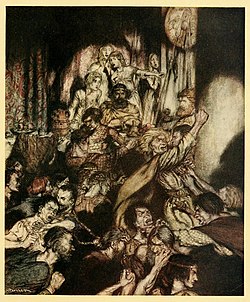
Fianna (/ˈfiːənə/ FEE-ə-nə, Irish: [ˈfʲiən̪ˠə]; singular Fian;[1] Scottish Gaelic: Fèinne [ˈfeːɲə]) were small warrior-hunter bands in Gaelic Ireland during the Iron Age and early Middle Ages. A fian was made up of freeborn young men, and some women, often from the Gaelic nobility of Ireland, "who had left fosterage but had not yet inherited the property needed to settle down as full landowning members of the túath". For most of the year they lived in the wild, hunting, cattle raiding other Irish clans, training, and fighting as mercenaries. Scholars believe the fian was a rite of passage into manhood, and have linked fianna with similar young warrior bands in other early European cultures.
They are featured in a body of Irish legends known as the 'Fianna Cycle' or 'Fenian Cycle', which focuses on the adventures and heroic deeds of the fian leader Fionn mac Cumhaill and his band. In later tales, the fianna are more often depicted as household troops of the High Kings.
The Fenian Brotherhood of the 19th-century and the Fianna Éireann, an Irish nationalist youth organisation of the 20th century, are named after them.